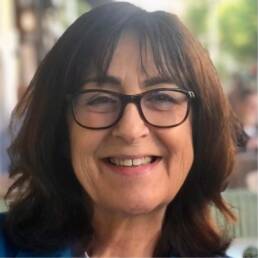and no, it's not being told how to do their hair
Just recently I reflected on the tired comment often made to older women of looking 'good for your age' and the inherent ageism of such remarks. So I was interested to read an article in British Vogue written to highlight the importance of doing what feels right, whatever your age.
The Vogue article comments that there has been shift in attitudes towards hairstyles for older women, saying it’s a “welcome move towards embracing our true selves, shunning societal expectations around how we ‘should’ look in favour of what makes us feel good.” That’s great, and right on message, as I wrote in the earlier comment piece (you can read that here).
If only Vogue had not headlined their article: “The Most Flattering Long Hairstyles If You’re 50-Plus”. OK, so now we are back to being told what we ‘should’ do…
It goes on to quote celebrity hairdresser Paul Edmonds. Referencing Sarah Jessica Parker, Monica Bellucci, Julianne Moore, Michelle Pfeiffer, Jennifer Lopez, Naomi Campbell and Jane Seymour he says: “All of these women look great for their age, without trying to look like they’re 20.”
These are women for whom ‘looking great’ in public has been the default option their whole working lives, subject as they are to the pressures of maintaining appearances to secure acting roles in an environment long known to be one of the worst for gendered ageism. Things may be changing, and Monica Bellucci may have been a mould-breaking ‘Bond woman’ providing love interest to 007 in the place usually occupied by all those younger ‘Bond girls’, but she’s the exception to the rule that Hollywood casts young women scarcely out of their teens as the love interest of mid-life men, as with Jane Seymour and Roger Moore in Live and Let Die, where there was a 24 year age gap.
Using these exceptionally famous and immaculately presented icons as a reference point is to reinforce unrealistic attitudes for all women, whether older and judging themselves against such impossible role models, or younger and receiving the message they must somehow aspire to such standards as they age.
The comment ‘for their age’ simultaneously undermines even these most beautiful of women. Adding they should not try to look ‘too young’ demonstrates the impossible task before all women. Try hard, but not too hard.
The irony is compounded by Paul Edmonds being an older man himself, with his 40-year career profiled on his eponymous website with the comment “you’ll still find him turning out some of the hottest looks” as though that should be surprising. The ‘still’ changes everything, just like ‘for your age’: ageism affects everyone, and both men and women can do more to tackle the subtle and insidious remarks that reinforce this. Together, we can change society’s attitudes for the future.
- What’s your view? Join the debate in the community where women share
Author

Maggie Taylor
Founder of Lumin, creating opportunities for women solopreneurs to collaborate, grow, and build successful businesses, fuelled by shared knowledge, mentorship, and real partnerships across generations
Related Posts
the work-life balancing illusion
We talk a lot about work-life balance, but for many women, the ‘life’ side of…
07/03/2025work-life balance,burnout,solopreneurship,gender equity,domestic load,productivity,sustainability,multitasking myth,lifewellbeing,careers,women entrepreneurs
why gender-inclusive product development matters
The way we design our world has long been shaped around a ‘default male’…
20/02/2025life,missionWomenInBusiness,InclusiveDesign,GenderEquity,ProductDevelopment,WomenInInnovation,WorkplaceEquality
mastering the career pivot
Career pivots — intentional shifts in professional direction — often arise at…
18/12/2024career change,career pivots,women in leadership,career planning,preventing burnout,work-life balance,life,communitymentoring,careers,professional growth



